Chitra Soundar's Blog, page 6
June 11, 2017
Come Read with Me on Empathy Day
Empathy Lab UK along with authors, libraries, Patron of Reading, Society of Authors and other like-minded people is launching Empathy Day on 13th June. This is the first such celebration and the hope is to continue to celebrate empathy and promote mutual understanding in communities and schools across the year.
As a daughter, sister, aunt, and friend, I believe empathy starts early and starts at home. How we treat our families on good days and bad days, how we like to be treated when we are down and when we are raring to go is as important as scoring high grades, making money or even winning Gold Medals in competitions.
But how do we build empathy amongst young people? How do we ensure the next generation has a reserve of empathy and shared experiences to tap into? Books are a wonderful way to learn about others, or what we perceive as otherness. We’re often afraid and wary of new and unfamiliar things. By getting to know others – they perhaps are no longer strange to us and hence no longer other.
Who are these others? Where do they live? Why should we care?
In a society like ours, where many politicians are asking us to be afraid of others, defining the other is important. What is this other-ness? Is it a different religion, language or the way we dress? Whether we follow the same religion or not, whether we speak the same language or not, do we all not laugh and cry at similar things? Do we all not want happiness, love, friendships, an ice-cream on a hot day and cute cat pictures on social media?
To celebrate the first Empathy Day, authors are visiting schools and reading books that teach us empathy and to walk in the shoes of others. You can recommend a book, a song, a movie that to you represents empathy, that would show the reader / listener/ viewer what it is to understand the world from another viewpoint. Do you have activities, poems and songs to share? Tell us on twitter with #ReadforEmpathy hashtag.
Want to know more and the science behind Empathy? Check out these resources.
And don’t forget – visit the Empathy Day website on 13th June to get hold of the Read for Empathy Guide.
And to end I want to share this video that was useful to me to understand empathy – do watch if you have a few minutes.
May 4, 2017
An Irreverent Guide for Patrons of Reading
Originally published on http://www.patronofreading.co.uk/
Don’t worry! This guide will not be serious. This guide is neither full of practical tips nor some amazing ideas. It’s just another writer, avoiding the work-in-progress, hoping to rescue thousands of children from forced learning of subjunctive clauses and modal verbs.
Patron of Reading is a bonkers idea from the three musketeers – Tim Redgrave, Jon Biddle and Helena Pielichaty. And more crazy people like authors, illustrators, school teachers, head-teachers and librarians joined up and made this bonkers idea more brilliant. Who would have thought reading for pleasure was a thing? DoE haven’t heard of it, it seems! But we don’t worry much about them when we have wonderful characters and amazing facts in so many books.
To me, being a Patron of Reading is an adventure. By adventure I mean, I have no idea what I’ve got myself into and I figure out as I go, guided by the children and the teachers who have invited me in.
So how does this adventure start? Like all adventures, it starts with a tall man with a big heart and almost no hair. He checks you out with his twitter thermometer and measures your ability to read for pleasure. You write children’s books? Then don’t worry – most probably you’re already afflicted with this condition.
Then you get listed on the Patron of Reading website. Think Match.com except for matching hibernating authors with super-humans like librarians and teachers. Like in any dating profile, just reveal enough of your reading for pleasure tendencies and the general neighbourhood where this affliction affects you – and I mean more than your own room – like a city where people live and schools are run. (At least for now; if you don’t vote, who knows, all parents might have to home-school compulsorily).
[image error] See what I did there!
Then the tall man with a big heart tweets out your patron profile to a legion of followers who re-tweet it as if these are cute cat pictures until an eager school spots you and goes Aha! We’ve would like that one please – yes that author with the yellow shirt, long hair, standing next to a stack of books and a pile of laundry. Is that you? Then you’ve been matched.
Once you’re matched, the above-mentioned tall man will approach you with details of your suitor. Where is the school? Who will be in touch with you? Who is this teacher who on top of everything they do, has agreed to be the Patron of Reading coordinator.
[image error]Like in any self-respecting matching situation, you get to talk (and by talk I mean, by email or phone or Skype or telepathy, whatever suits) with the potential school you will be patronising.
Here is the thing – this is where you reveal your reading habits – poetry? Ghost stories? Adventures set in abandoned islands? Don’t be shy. You’d be surprised when you listen to their choices.
This is where you find out what does your potential suitor want? What kind of school is it? What motivates the children? Why did they choose you? What could you bring to the table (other than a chair of course)?
You have questions? You are too shy to ask your potential suitor? Shoot it across to the matchmaker. He has weathered every what, why and when.
[image error] One too many?
Well – what do you think? Have you agreed the terms and conditions of patronising? Do you have a date setup? Ooh! That’s exciting, isn’t it?
Hold fire! Don’t relax yet. Plan the first visit as you would plan any school visit – except you’re not going to be running creative writing workshops. You’re going to find ways to promote reading for pleasure. The keyword as you might have noticed is PLEASURE!
Like in any first date, take it slow. Don’t overwhelm the school with your enthusiasm. I’ve been there! Both in life and in schools. Figure out what they need from you and in what levels of enthusiasm. You might have time between two book projects and want to run a competition for the children. (Or you just want to procrastinate). Teachers as you might have guessed from teachtwitter, are an overworked bunch. They might not have time to jump into every rabbit-hole the patron wants to. So KEEP CALM and READ FOR PLEASURE.
Then agree frequency of visits. Ask them how they would like to stay in touch when you’ve returned to your cave after inspiring them with the love of reading. Maybe they would want to, maybe they won’t. Maybe the things you initiated on the first visit doesn’t fully pan out. Don’t fret. You get to go back, build relationships and try new things.
That’s it – there is no secret handshake (well, I’m not telling you, if there’s one), there is no heavy manual in all European languages (Brexit means Brexit, didn’t you know?)
And there are no set rules about how you patronise reading. Standing up, sitting down, upside down, reading poetry, non-fiction, stories, picture books, newspapers and cereal boxes – it’s all up for grabs.
Willing to take the plunge? Reach out to the tall man with a big heart (also called @jonnybid) and leave the rest to the universe.
Chitra Soundar is a Patron of Reading at West Earlham Junior School in Norwich, where she brings stories from different countries into the classrooms. She gets on their radio show, teaches them voice modulation and tells them stories from brilliant books. And when she’s not patronising, this is what she’s up to. Find out more here. Have questions, shoot her a tweet at @csoundar.
March 21, 2017
World Poetry Day 2017
Today is World Poetry Day and I’ve been itching all day to come back home and read poetry – Swirl words in my mouth, say it aloud, marvel at the meaning and feel the beat in my blood. What should I read and what am I in the mood for? I could go back to one of my favourite poems – so simple you can memorise in a few minutes.
https://www.poetryfoundation.org/poems-and-poets/poems/detail/45032
Or I could read some perfect verse from Ted Hughes – The Thought Fox.
http://www.poetryarchive.org/poet/ted-hughes
Or I could read nonsense rhyme (and an alternate legend) from Roald Dahl.
https://www.poemhunter.com/poem/cinderella-35/
Then I decided I should check out contemporary Indian poets who are writing amazing poetry in both their own language and in English – people who have had similar experiences to mine, poems that have arisen from the crowded streets of an Indian city.
Here is a little taste of the poems I’ve been discovering. So delicious, so full of meaning, like a layered cake full of your favourite flavours and some that are full of bitter truths like a little piece of ginger inside a plum cake.
Here read this by Anamika, translated into English.
Which is the place from where we fall,
become clipped nails,
fallen hair trapped in combs,
fit only to be swept away?
Read the rest here: http://bigbridge.org/BB17/poetry/indianpoetryanthology/Anamika.html#
And read this, my latest favourite poem by Jerry Pinto, who also writes wonderful children’s books.
I want a Poem
I want a poem like thick tropical rain
Dense green spatter of syllables
Drumbeat consonants, fertile with meaning.
Sudden. Short. Unforgettable.
Afterwards, jungle silence.
And it goes into more beautiful imagery… read the rest here.
And here is a scene from a crowded train in Mumbai – the poem Andheri Local by Arundhathi Subramaniam evokes emotional and physical proximity so well.
Like metal licked by relentless acetylene
we are welded –
dreams, disasters,
germs, destinies,
flesh and organza,
odours and ovaries.
Find out how the narrator feels when she (or he) gets out of the carriage.
And finally I want to finish one of the greats of Indian poetry – Maharishi Rabindranath Tagore.
This snippet from verse 21 is one of my favourites from Gitanjali – the Nobel Prize winning collection of spiritual poems.
The spring has done its flowering and taken leave. And now with the burden of faded
futile flowers I wait and linger.
The waves have become clamorous, and upon the bank in the shady lane the yellow
leaves flutter and fall.
What emptiness do you gaze upon!
Do you not feel a thrill passing through the air with the notes of the far away song
floating from the other shore?
I can’t let WorldPoetryDay go past me without writing a little snippet myself. Here is my humble attempt
When My Grandmother Came…
Chitra Soundar
When my grandmother came, as an immigrant bride
She brought with her, a box of bronze
Simple, plain and its edges chipped by grandmothers gone.
I opened it to find,
The coolness of cumin,
And the grace of fenugreek,
The confidence of coriander,
The passion of peppercorns.
When my grandmother came, naïve and wide-eyed,
The box she brought, the one of bronze
Fragrant and familiar of things left behind.
I opened it to find,
The sliver of joy,
And the reason for love,
The reason to belong,
The attar of HOPE!
March 10, 2017
Fabulous February
Where is February, I ask. It has been a whirlwind of activities in London and rest of England, armed with a bag of books and props, often looking like a bag lady on National Rail Service. And it was mostly fun even when rain poured through dark skies and sleep was a rare commodity.
This February has been extra special – having been invited to the prestigious Imagine Festival at Southbank to run workshops and to the Chester festival of half-term fun and to the South London’s favourite bookstore Tales on Moon Lane’s half-term festivities. Half-term ended with wonderful storytelling at Discover Stratford.
World Book Day ran almost back to back with Half-term across England and my story train barely stopped between the two. I was on the move, constantly checking my orange National Rail tickets and printed maps just in case my phone runs out of juice. Between the boroughs of London, I moved from East to West to North to South, testing TFL’s quality of service.
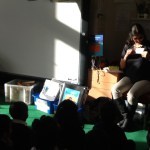

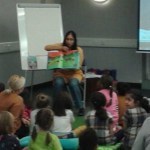



When I was bereft of sleep and missing home-cooked dinners, there is one thing that kept me going. My engine was fully powered by the stories I tell and the stories the children were inspired to write. We made up wonderful stories with the children and in some schools we told them and in some we wrote them down. Either way, there was no limit to their imagination. That’s the primary reason I go into schools and do events – to fire up the imagination of both children and parents alike and at the same time, be absolutely enthralled by the stories the children create.
From Greek gods to aliens, pigs to fishes, our stories were full of adventures, mishaps, journeys and cartloads of fun. Here are a few stories children jotted down during the workshops.


[image error]
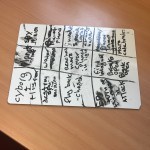

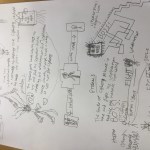
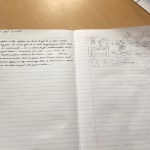
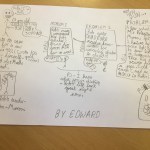
If you want to be part of the next workshop, do sign up to my newsletter so you can find out about an event near you or if you want to invite me to your schools, do get in touch.
February 2, 2017
Not Yet! – #ReadDiverse2017 Review
 Not Yet! is a picture book published by Tulika Books, written by Nandana Sen, and illustrated by Niloufer Wadia. I was not planning to be at this book launch but for the fact that I was at Jaipur Lit Festival, and had met Nandana Sen the previous evening and of course the book was published by Tulika Books who also published two of my stories.
Not Yet! is a picture book published by Tulika Books, written by Nandana Sen, and illustrated by Niloufer Wadia. I was not planning to be at this book launch but for the fact that I was at Jaipur Lit Festival, and had met Nandana Sen the previous evening and of course the book was published by Tulika Books who also published two of my stories.
Not Yet! is a classic bedtime picture book where the child and parent tussle for control. In this imaginative story in rhyme, the child brings to life the animals in her imaginatio n and the mother tries to remind her of bedtime. And of course all naughtiness has to end in niceness and it does.
n and the mother tries to remind her of bedtime. And of course all naughtiness has to end in niceness and it does.
The story has also been translated into Bengali by the author herself, with a little help from her mother, the legendary poet Nabaneeta Dev Sen.
It’s a great book to read aloud and children could of course even act it out – as long as they do get into bed with a little kiss – as weary parents would know. Nandana Sen had invited kids from a local school and from the audience to the stage and they did have a wonderful time acting the animals out.
I’m hoping to read it to my nephews and I’m sure they too would enjoy it given they have a menagerie of animals in their room. Who knows – they might make up new play about their donkey, meerkat and more.
January 31, 2017
The Twentieth Wife – #ReadDiverse2017 Review
This book was thrust into my hands by an enterprising bookseller in Jaipur in a small shop filled with intelligently curated collecti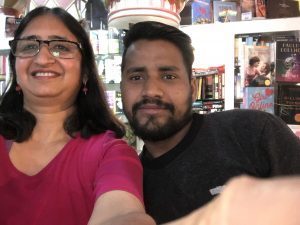 on. I almost stumbled into the bookshop with no expectations and had an illuminating chat about children’s book choices, the scene of Indian novels and the cost of books at Jaipur Lit Fest. He thrust Palace Of Illusions (by Chitra Bannerji Divakaruni) into my hands first, and then I told him I’ve read that, he then pulled out The Twentieth Wife.
on. I almost stumbled into the bookshop with no expectations and had an illuminating chat about children’s book choices, the scene of Indian novels and the cost of books at Jaipur Lit Fest. He thrust Palace Of Illusions (by Chitra Bannerji Divakaruni) into my hands first, and then I told him I’ve read that, he then pulled out The Twentieth Wife.
The Twentieth Wife is a story about Nur Jahan, the 20th wife of Emperor Jehangir. It read like an epic thriller – as reality and imagination fused into a single narrative. The story of Salim (who later becomes Emperor Jehangir), the story of Mehr-un-nisa who becomes Nur Jahan and the intertwined lives of Akbar and his harem and the imperial battles.
From the birth of the child in dire circumstances, the kindness of strangers and the childhood crush to a woman who will not be beaten by fate or happenstance, Mehr-un-nisa is a modern woman, a woman way ahead of her times and we want her to marry Emperor Jehangir, even though we knew she did, as history books repeat.
I was completely captivated by the voice of the narrator, the story of this girl who turns into the most beautiful and intelligent woman and was rooting for her from the beginning. I was afraid for her when she marries Sher Afghan, worried about her when they move to Bengal and amazed at her position when she holds out for marriage than settling for anything less.
 Indu Sundaresan has captured the time of the Mughals in modern language. The contemporary speech and the subtle descriptions of things unfamiliar, her use of Persian, Hindi and English words just right, was as wonderful as a Mughal recipe cooked in the kitchens of Jehangir.
Indu Sundaresan has captured the time of the Mughals in modern language. The contemporary speech and the subtle descriptions of things unfamiliar, her use of Persian, Hindi and English words just right, was as wonderful as a Mughal recipe cooked in the kitchens of Jehangir.
I’m not a natural reader of historical fiction. I’m once bitten twice shy about writers who cannot manage the balance between description and plot, sometimes judging more than showing. But when I started this book, I was so engrossed that I realised I was quarter of the book in when I surfaced for sustenance.
India is no one thing. Try and bottle into a brand and you’ll fail. This book is a glimpse into the Turkish-Persian-Mughal influence, at the height of Mughal imperialism. This book is neither the victory lap of the Mughal emperors nor the defeated histories of Indian kings. This book is the story of a girl, who aspired to be queen and became one with her beauty, intellect and patience. This book is the story of a prince who couldn’t let her get away. Perhaps he was one of those men who fell in love often (we all grew up with the romantic story of Salim and Anarkali) – but the love for Mehr-un-Nisa seems to have transcended decades and withstood political feuds. This is a better love story than of Anarkali who supposedly was buried alive for falling in love with Salim.
This is also an enabling story for many young women of today who are bound by their orthodox circumstances. This story in simpler form should reach more children – to show them it is possible to aspire to be anything you want – even the Queen of the Mughal Empire.
A must-read for all girls wherever they are!
January 28, 2017
Countdown by Amitav Ghosh – #ReadDiverse2017 Review
I didn’t expect to find this book at all. I was visiting Higginbothams in Chennai, my yearly pilgrimage. Year on year, I’ve seen this legendary bookshop lose its allure, and fall into the shadows – with dusty shelves, no curation, no new books. 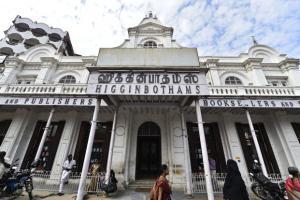 Their mainstay still being academic books – their general categories reduced to dust covered Indian editions.
Their mainstay still being academic books – their general categories reduced to dust covered Indian editions.
As I perused the shelves, I found a thin book with Amitav Ghosh’s name. I first thought it might be a novella – and I like small books – books that give me a sample of the literary prowess without demanding the next week of my life. I picked it up and I was more intrigued to find that it was non-fiction – a journalistic essay on the nuclear powers of India and Pakistan. I was intrigued.
It didn’t take long to read, but still the arguments were well placed, the research and first hand gathering of information was wonderful and it wasn’t an opinion piece – it was really a good analysis of why India and Pakistan are hell bent on acquiring nuclear weapons and the probability of an impending war.
 Pokhran where India’s nuclear tests were conducted
Pokhran where India’s nuclear tests were conductedThe facts are scary, and heart-breaking. The reality is frustrating. Any Indian who grew up in the 20th century India knows that politics has stopped functioning for its people and I could hear the echoes of why our politicians are failing us. When this travesty grants control of the button to start nuclear war to these self-serving political class, we are truly facing a similar crisis to that of America and the UK where demagogues and identity politics are rife.
Imagine a world where North Korea is poised to press the button as it now has an agnostic, inward looking US government along with China being angry with the US’s handling of foreign policy under the current administration; India and Pakistan now left to their own devices to deal with their squabbles while the US itself is not far from the pressing the dreaded button as a show of hollow might, with UK not far behind. We have a truly global nuclear conflict in sight and for the first time the planets have aligned for the wrong kind of outcome.
In this context, reading Countdown was like a wake-up call. Even though it was written years ago, when BJP government was in power, with Modi now in power under the same BJP government, with Hindu ideologies that are performing surgical strikes into Pakistan and gloating over it, we are truly back into countdown mode. The nationalistic wave that has swept the nation in 2015-16 has whipped up a frenzy of anti-Muslim rhetoric and the said button is not too far away.
If anything, I think this book should be reissued again in today’s context with perhaps some updates on how this threat is more real in a world where Narendra Modi boasts of his friendship with Donald Trump and how their anti-Islamic rhetoric is not in step with the liberal citizens of their country.
Before We Visit the Goddess – #ReadDiverse2017 Review
 I have the utmost privilege of having this book signed by Chitra Bannerjee Divakaruni and also meeting her at JLF 2017.
I have the utmost privilege of having this book signed by Chitra Bannerjee Divakaruni and also meeting her at JLF 2017.  I had to sit on my hands until I reached JLF to buy this book so I could get it signed by Chitra.
I had to sit on my hands until I reached JLF to buy this book so I could get it signed by Chitra.
I’ve been reading so many children’s books and especially those that are full of adventure and humour. But I’ve been steadily carving some time out to read books by diverse authors – especially Indian authors.
I read “Before We Visit the Goddess” over a single day. I started it at breakfast and kept reading while waiters deftly moved around me at the restaurant. I read in the hotel room postponing my shopping in Jaipur and I finished it in record time before we left for the Writers’ Ball.
The story moves between Calcutta and US between generations of mothers and daughters. From Durga to Sabitri to Bela to Tara, the story shows us how their lives are intertwined across continents. It shows how every decision taken by an earlier generation impacts the futures and fortunes of the next.
As a writer, I was amazed at the switch between tense and viewpoint, the effortless transition from past and current and the command of language. As a reader, I was inspired by Sabitri’s courage and her honesty, on her motives and her fallacies. I was frustrated with Bela and her choices until she breaks free and I was afraid and hopeful for Tara. I enjoyed some of the cameo roles in the story including the south Indian scientist who gives Tara a perspective she had not seen before.
It is a story for all mothers and daughters, regardless of where they were born and where they are right now – across cultural and national boundaries. This is a subtle story of vanquishing demons – those demons that women nurture in their hearts that keeps them bound and guilt-ridden. This is a story that illuminates Tagore’s saying about love.
Love's gift cannot be given, it waits to be accepted.
January 25, 2017
Nowhere Girl – A #ReadYourWorld Review for MCBD 2017.
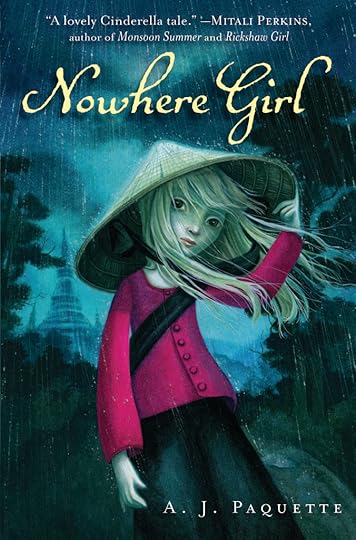 AJ Paquette kindly gave me an electronic copy of this book to read and I’m really enjoyed reading it.
AJ Paquette kindly gave me an electronic copy of this book to read and I’m really enjoyed reading it.It’s not always that a story is set in South East Asia and shows us the intricacies and wisdom of the people there. Right from the start, I loved the narrator, she had me wondering where she was and what dangers awaited her.
As story unfolded, I loved not just the narrator but many of the characters I met on the way. The Warden was such a beautiful soul and so were the inmates and guards. Isra stood out as a person I wanted to meet in real life.
Luchi, the protagonist is vulnerable, yet has to learn her strength. She is new to the outside world and the outside world to her. But she learns slowly to trust, to unravel the mysteries of this world that is ours, and she makes mistakes like all of us do. Sometimes we all trust a bit too much and sometimes we are too careful.
 When Luchi stays with Kiet’s family – I almost longed to be there with her. But Luchi is right, she had to be on her way and she couldn’t trust anyone.
When Luchi stays with Kiet’s family – I almost longed to be there with her. But Luchi is right, she had to be on her way and she couldn’t trust anyone.
When I visited Bangkok the first time, my immediate response was – I know this place. This looks so familiar just  like Chennai, the city I grew up in. It had the same spirit, the same busy-ness and the same chaos intertwined with an unseen pattern that worked. And anyone who hasn’t been in a big city before would be overwhelmed just like our Luchi. And she manages to find her way around although she is betrayed when least expecting it.
like Chennai, the city I grew up in. It had the same spirit, the same busy-ness and the same chaos intertwined with an unseen pattern that worked. And anyone who hasn’t been in a big city before would be overwhelmed just like our Luchi. And she manages to find her way around although she is betrayed when least expecting it.
I grew up with a maxim that everything happens for a reason. And that’s exactly what I would tell Luchi if I had met her a corner shop in Bangkok. Because her dire situation take her closer to her final destination.
I loved the poetic quality of AJ Paquette’s language in this book.
The descriptions and the story unfolded as if
they were spun of silken words.
My concern for Luchi kept me going.
I did want a bit more of the danger though. Luchi even though she does not know, has a safety net around her except when she starts walking on her own and towards the end and even then she gets a guardian angel. I think Paquette loved her so much that she didn’t put her in too much danger. As a reader, I wanted Luchi to be able to face the world on her own for a little longer. In this war-ravaged world, there are many such girls on their own, escaping camps or war zones and having to to survive on their own, and it would help them gain strength.
Nevertheless, it’s a story of adventure, of love, of families far and near, of families that are related by blood and not and more importantly of trust – trusting others and one’s own self. It’s a feel-good book for boys and girls with a sense of adventure. I’m sure it charms many readers as it charmed me.
 I created a pinterest board with the floating market, just outside of Bangkok. It is still one of my favourite places since I visited it in 2005.
I created a pinterest board with the floating market, just outside of Bangkok. It is still one of my favourite places since I visited it in 2005.
https://uk.pinterest.com/chitrasoundar/thailand-bangkok/
Here is an activity for all readers – can you create a pinterest board (or a cardboard collage) of all the places Luchi has visited in the story? Share it with us with the tag #ReadYourWorld.
 Multicultural Children’s Book Day 2017 (1/27/17) is in its fourth year and was founded by Valarie Budayr from Jump Into A Book and Mia Wenjen from PragmaticMom. Our mission is to raise awareness of the ongoing need to include kids’ books that celebrate diversity in home and school bookshelves while also working diligently to get more of these types of books into the hands of young readers, parents and educators.
Multicultural Children’s Book Day 2017 (1/27/17) is in its fourth year and was founded by Valarie Budayr from Jump Into A Book and Mia Wenjen from PragmaticMom. Our mission is to raise awareness of the ongoing need to include kids’ books that celebrate diversity in home and school bookshelves while also working diligently to get more of these types of books into the hands of young readers, parents and educators.
Despite census data that shows 37% of the US population consists of people of color, only 10% of children’s books published have diversity content. Using the Multicultural Children’s Book Day holiday, the MCBD Team is on a mission to change all of that.
Current Sponsors:
MCBD 2017 is honored to have some amazing Sponsors on board. Platinum Sponsors include Scholastic, Barefoot Books and Broccoli.
Other Medallion Level Sponsors include heavy-hitters like Author Carole P. Roman, Audrey Press, Candlewick Press, Fathers Incorporated, KidLitTV, Capstone Young Readers, ChildsPlayUsa, Author Gayle Swift, Wisdom Tales Press, Lee& Low Books, The Pack-n-Go Girls, Live Oak Media, Author Charlotte Riggle, Chronicle Books and Pomelo Books
Author Sponsor include: Karen Leggett Abouraya, Veronica Appleton, Susan Bernardo, Kathleen Burkinshaw, Delores Connors, Maria Dismondy, D.G. Driver, Geoff Griffin, Savannah Hendricks, Stephen Hodges, Carmen Bernier-Grand,Vahid Imani, Gwen Jackson, Hena, Kahn, David Kelly, Mariana Llanos, Natasha Moulton-Levy, Teddy O’Malley, Stacy McAnulty, Cerece Murphy, Miranda Paul, Annette Pimentel, Greg Ransom, Sandra Richards, Elsa Takaoka, Graciela Tiscareño-Sato, Sarah Stevenson, Monica Mathis-Stowe SmartChoiceNation, Andrea Y. Wang
We’d like to also give a shout-out to MCBD’s impressive CoHost Team who not only hosts the book review link-up on celebration day, but who also works tirelessly to spread the word of this event. View our CoHosts HERE.
MCBD Links to remember :
MCBD site: http://multiculturalchildrensbookday....
Free Multicultural Books for Teachers: http://bit.ly/1kGZrta
Free Kindness Classroom Kit for Homeschoolers, Organizations, Librarians and Educators: http://multiculturalchildrensbookday....
Free Diversity Book Lists and Activities for Teachers and Parents: http://bit.ly/1sZ5s8i
January 24, 2017
Changes to my My #DiverseAThon 2017 TBR Pile
Well, as predicted, being part of the Jaipur Literature Festival has completely changed my TBR pile for #DiverseAThon 2017.
I’m keeping two books from my original list and the rest have been moved to February and March as I’m dipping into these gems I picked up Jaipur Literature Festival.
So the ones I’m keeping are:
The new ones are really varied – contemporary fiction to historical fiction to poetry to children’s books.
Here are the new additions to my #DiverseAThon 2017
 Not Yet! Written by Nandana Sen Published by Tulika Books
Not Yet! Written by Nandana Sen Published by Tulika Books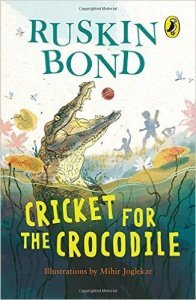 Cricket for Crocodile, Written by Ruskin Bond.
Cricket for Crocodile, Written by Ruskin Bond. The Twentieth Wife by Indu Sundaresan – Historical fiction set in the Mughal Period
The Twentieth Wife by Indu Sundaresan – Historical fiction set in the Mughal Period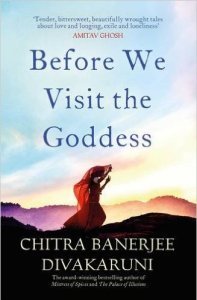 Contemporary inter-generational fiction of mothers and daughters
Contemporary inter-generational fiction of mothers and daughters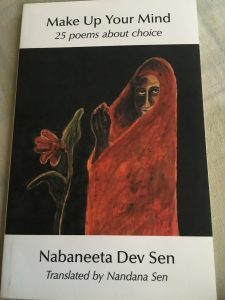 Make Up Your Mind – 25 poems about choice – Nabaneeta Dev Sen, Translated by Nandana Sen
Make Up Your Mind – 25 poems about choice – Nabaneeta Dev Sen, Translated by Nandana Sen






